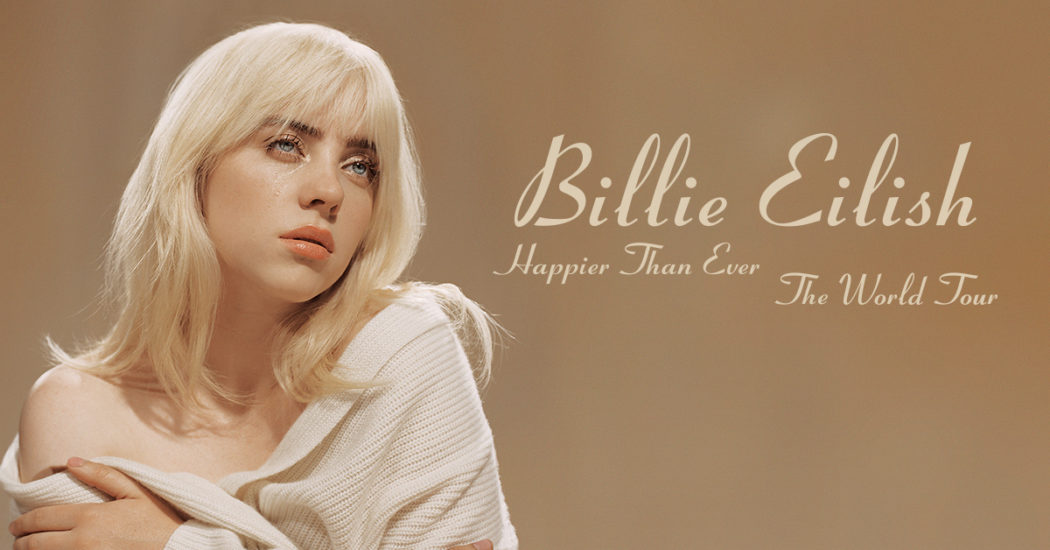‘Happier Than Ever’ track-by-track review
One of my favorite things about Billie Eilish is that she creates music you can get lost in — something most artists only hope to achieve. Billie’s music doesn’t follow a strict structure or pattern, it ebbs and flows, mimicking her unique vocals. She’s hypnotizing. Most of the time, I don’t pick up on which lyrics are the chorus, especially when it’s my first listen.
Maybe it’s because Billie writes her music with her brother, Finneas O’Connell. Maybe it’s her ambition, drive, or passion for music. Or maybe, Billie is just lucky. Either way, Billie’s new album, “Happier Than Ever,” did not disappoint. In fact, the new album racked up more than one million plays on Spotify the day it was released (July 30).
Billie starts her new album off with “Getting Older,” a deceptively light track with heavy lyrics. She writes, “Things I once enjoyed just keep me employed now,” leaving listeners to wonder if Billie is falling out of love with music.
You can hear Finneas’ influence on his sister’s music in the second track, “I Didn’t Change My Number.” This song is Billie’s version of a break-up anthem, though it’s much more indie than most heartbreak hits are. My personal favorite lyric is when Billie claims, “I didn’t change my number, I only changed who I believe in.” Boom, roasted.
“Billie Bossa Nova” dramatically changes the pace of the album thus far. I wouldn’t think that Billie’s voice would go well with a reggae tune, but it does.
The album takes a quick turn with the slower track “my future.” Billie juxtaposes phrases like “I can’t seem to focus” with “I’m just a mirror” to show her complete fascination with her future thereby illustrating the frustration that comes from eagerly awaiting new adventures.
The real bop of “Happier Than Ever” comes to us in “Oxytocin.” I’ve never heard a song that is worthy to be in a workout and a baddie playlist all at once, but Billie has pulled it off. Is there anything better than the climax of “Oxytocin?” Probably not.
I’ll be honest, at first, “GOLDWING” was boring. In the beginning, it was just Billie singing soft high notes that I’d imagine would be sung in a cathedral. But then, a minute into the snoozefest, Billie pulls out a sick beat and brings the vibes all the way back up again. If I hadn’t been paying attention, I would have thought that there were two different songs in “GOLDWING.”
“Lost Cause” is the song. It’s the track that sets all the exes on fire. It’s the I-can-and-will-do-better-than-you track.
Billie does the trippy two-songs-in-one thing again in “Halley’s Comet,” but towards the end, there’s an added effect to her vocals, making the music sound more distant.
Putting a monologue in an album is not unheard of, but “Not My Responsibility” hits hard. Billie uses track nine to discuss the eyes on her. She concludes that while everyone has an opinion about her body, music, and personality, their opinions are not her responsibility.
Billie uses “OverHeated” to talk about being constantly objectified by the media, even though she “was only built like everybody else.”
“Everybody Dies” navigates the grief and pain that comes from mortality. Billie writes “I just wonder why you’d wanna stay if everybody goes” but then concludes the track with “You are not alone.”
In “Your Power,” Billie reflects on someone who probably abused their power over her. She uses rhetorical questions to convey a sense of confusion and betrayal, finally declaring “You might not wanna lose your power, but power isn’t pain.”
Billie grapples with her fame in “NDA,” which stands for non-disclosure agreement. While her success has brought Billie money and creative freedom, it has also brought her a caged personal life that is difficult to manage.
“Therefore I Am” was the first single of the album and plays with René Descartes’ famous saying: “I think, therefore I am.” Billie’s self-directed music video for this song is one of the most entertaining and creative things I’ve seen in a while.
“Happier Than Ever” describes a relationship that is not toxic, but it’s not good either. Billie is not happy, but there’s no reason for her unhappiness (at least, not in this track).
The album closes with “Male Fantasy,” a ballad that finds Billie bored of her feelings and distracting herself from pain.
It’s clear that Billie Eilish and Finneas O’Connell are not going anywhere. Together, they’ve written striking music and lyrics that cut deep. But is Billie Eilish really happier than ever? We’ll have to see.
– emily.white@usu.edu

